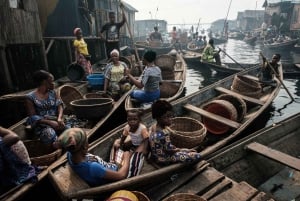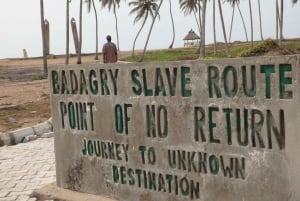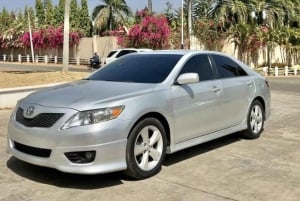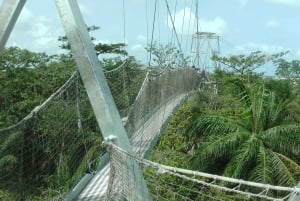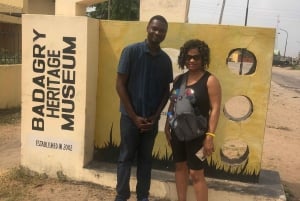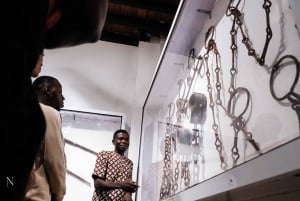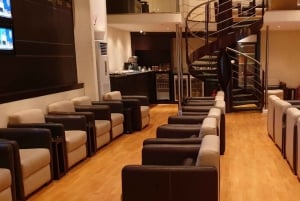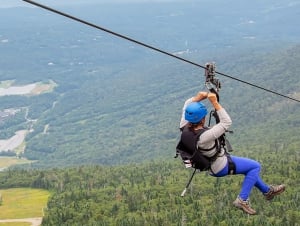South South Region
Your Local Guide to the South South Region of Nigeria

The South-South region of Nigeria comprises of six states and is strategically located at the point where the Y tail of the river Niger joins the Atlantic Ocean through the Gulf of Guinea. Though a relatively small stretch of land, the south of the country provides the economic mainstay of the economy: oil. In addition to oil and gas, the region equally contributes other key resources, with potential huge investment opportunities in tourism and agriculture.
Akwa-Ibom State - Promised Land

Akwa Ibom was carved out of the then Cross River State on 27th September, 1987, during the military regime of General Ibrahim Babangida. Akwa-Ibom is located in the coastal part of the country, with an area of 7,081 square kilometres and a population of almost 5 million. The state shares boundaries with Cross River State, Rivers State, Abia State and the Atlantic Ocean, with Uyo the capital city. Other prominent cities include Ikot Ekpene, Eket, Abak, Ikot Abasi, Itu, Mkpati-Enin, Nsitubom and Ibeno. The main languages in the state are Ibibio, Annang, Eket, and Oron. These languages are closely related with few dialectical differences.
Although there are some African religion practices, the state is predominantly Christians. The people are civil servants, with some farmers, hunters, traders, blacksmiths and fishermen. Akwa-Ibom has a rich historical and cultural heritage epitomised in folklore, dances, food, beliefs, songs and mythology.
Akwa-Ibom State is the third largest producer of crude oil in the country and is endowed with various resources such as palm produce, timber, maize, cassava, yam natural gas, salt, silver nitrate, limestone, clay, coal, and glass sand.
The government has made efforts to diversify the state economy in areas of mechanised agriculture, tourism and IT. This is demonstrated by the Ibom Rice, IT parks initiatives, the 5-star Ibom Meridien Hotel and Resort, a world-class golf course, Mobil Tank Farm and
Ibom Connection
Points of interest and things to do in Akwa Ibo include:
Ibeno Sand Beach (a beautiful scene with recreational facilities and excellent prospects for water sporting). Other notable beaches are at Eket, Ikot Abasi, Adadia, Nwaniba, Uta Ewa and Oron Beaches. Amalgamation House (an iconic building where Nigeria was made one geographical entity in 1914. Cease-fire was declared in this house in 1970 to mark the end the Nigeria-Biafra War). Oron Museum (houses some valuable artifacts and antiquities, also contains a gorgeous, shaded water front garden), National Museum (houses valuable antiquities in relation to the cultures of Akwa Ibom State). Lord Lugard Residence (a one-storey lodge where Lord Lugard lived during the amalgamation era). Mbo Forest Game Reserve, Slave Masters Lodge, Okopedi, Itu (white slave merchants resided here), Presbyterian Church, Itu (built by the famous Mary Slessor who stopped the killing of twins). Mary Slessor House Tomb, Royal Niger Boat Yard (a large boat yard where slave merchant ships were built and repaired). Sculptural Women Monument (erected to commemorate the heroics of women killed in the famous women riot of 1929). Ibom Plaza, Uyo (a monument that epitomises the unity of the people of Akwa Ibom State).
Bayelsa State - Pride of the Nation

Bayelsa was created on 1st October, 1996 by the military regime of General Sani Abacha. Bayelsa is located in the lower southern part of the Niger Delta region, and its capital is Yenagoa. There are 10 languages spoken in the state; of these, Izon, Nembe, Ogbia and Epie-Atissa are the most predominant. Bayelsa State which was created out of Rivers State during the military regime of General Sani Abacha on 1st October, 1996. The state has one of the largest crude oil and natural gas deposits in Nigeria. The name Bayelsa is short for three former Local Government Area, Brass, Yenagoa, and Sagbama.
Bayelsa is a multi-ethnic state comprising of groups such as Kolokunu, Ekpetiama, Igbriran, Atissa and Biseni. The state is mostly occupied by the Ijaws. Other tribes in the state are Nembe, Ogbia and Ogbein. Each these has their own dialect. The predominant religions here are Christianity and Traditional worship.
She shares territorial boundaries with Delta State on the North, Rivers State on the East and the Atlantic Ocean on both the West and South. Bayelsa state has a land mass of 21,110 square kilometres with the fewest Local Government Areas of 8.
Bayelsa State, a major oil and gas producing area, accounts for over 30% of Nigeria’s oil production and is also renowned for fishing, farming, lumbering, palm wine tapping, trading, carving and weaving. With the majority of the state under sea level, over three quarters of the area is covered by water and consists of a maze of meandering creeks and mangrove swamps. In addition, Bayelsa has large reserves of clay, sand and gravel which are of utmost importance to the industrial sector.
The major towns in Bayelsa State include Yenagoa, Amasoma, Sagbama, Kauama, Oloibiri, Ogbia, Oporama, Koluama, Obi, Brass, and Opokuma. There are eight local government areas; these are brass, Ekeremor, Kolokuma/Opkuma, Nembe, Ogbia, Sagbama, Southern-Ijaw and Yenagoa.
Points of interest and things to do in Bayelsa include:
Kaiama Market (developed at the bank of Kaiama River and fishermen and traders transact business). Nigeria’s First Oil Well, Oloibiri (12,008 feet deep, was discovered in 1956 and marked the start of Nigeria’s economic shift from Agriculture to Oil and gas). Ox-Bow Lake (contains modern galleria of theatre arts and a 5-atar hotel). Mungo Park Residence (used to be the divisional Headquarters of the colonial rulers of Brass division). Akassa Slave Transit Camp and Tunnel (the spot where slaves were camped and later conveyed to America and Caribbean through the Atlantic Ocean). Akassa Wildlife Forest (suitable for bird watching with over 69 species of migratory birds), Okpoama Beach (a natural sand beach found at the bank of the Atlantic Ocean where an annual Christmas fiesta takes place), Mangrove Creeks (Cruising down the creeks on a speedy boat may sound incredible to many but it is an experience of a life time for the daring tourist). There are real “road junctions” and “bypasses” along the water ways which are a wonder to experience). Apoi creek Forest, The Agricultural Palm Beach found in Ekeremor LGA, The Odi Holiday Resort located at Kolo Kuma/Opokuma LGA, The Ossiama Fish Lake found in Southern Ijaw LGA, The Koluama holiday resort found in southern Ijaw LGA, The Okpoama beach located in Brass LGA, The Isaac Adaka Boro Monument built at Kaiama in Kolokuma/Opokuma LGA, The Marble Monument of late Chief Christopher Iwowari built in Nmbe LGA, Statue of late King Ockiya Mausoleum at Ogbolomabiriin Nembe LGA, The Ancient Nembe War Canoe Regatta located at Nembe LGA.
Cross River State - The People’s Paradise

Cross River State was created out of the old South Eastern State in 1976 with its capital as Calabar. Being a coastal state, it shares boundaries with Benue State to the west, Abia State to the south and the Atlantic Ocean to the east. Cross River State has a land mass of 20,156 square kilometres. The major languages spoken in Cross River State are Ejagham and Efik with the Igbo tribe and language are also present in their western land borders. The state is divided into 18 Local Government Areas. The state has a projected population of about 3 million people who are bestowed with rich cultural heritage.
Important cities and towns are Calabar, Akamkpa, Ikon, Obubra, Odukpani, Ogoja, Okundi, Ugep, Obudu, Obanliku, and Akpabuyo
Cross River State is home to some of Nigeria’s most beautiful scenery. Over half the land is covered by tropical rain forests, making it one of the world's biodiversity hotspots. The state is also blessed with natural resources like oil and gas, limestone, kaolin, clay, salt, barite and quartzite.
Points of interest and things to do in Cross River include:
Calabar Museum (arguably the only museum in Nigeria that has abundant quantities of original documents linking to the slave trade and palm oil production in Nigeria). Duke Town Church, Cross River National Park, Mary Slessor Building, The Obong Palace, Kwa Falls, Calabar Cenotaph, Ikom Monoliths, Agbokim Waterfalls, Calabar Drill Monkey Ranch, Ekpo Bassey’s House, Bassey Duke Effigy, Amber Tinapa Resort, Obudu Mountain Resort, Afi Mountain Wildlife Sanctuary
Delta State - The Big Heart

Delta State is an oil producing state located in the region known as the Niger Delta. The state which was created in 1991 is divided into 25 Local Government Areas. Delta State has a land area of about 18, 050sq km and an estimated population of about 4.2 million. The state which used to be a part of defunct Bendel State was created in 1991 and got its name from the delta of the Niger River. There are various solid mineral deposits in the state which include crude oil, industrial clay, silica, lignite, kaolin, tar sand, decorative rocks and limestone, with many serving as raw materials for industries
There are also traditional festivals in every community; the Ishe Festival for peace and progress in Ewulu town, the Edjenu of the Agbarha Clan which takes place only once or twice in a lifetime and the Oki Masquerade of Torugbene.
Some important cities and towns are Asaba, Ugheli, Agbor, Abraka, Kwale, Oleh, Koko, Oghara, Ozoro and Burutu, with Sapele, Warri and Koko as major seaports.
Points of interest and things to do in Delta State include:
Abraka Turf & Country Club (arguably the only equestrian leisure club in Nigeria and it annually hosts an International Polo Tournament). River Ethiope Source (reputed to be the deepest inland waterway in Africa). Kwale Game Reserve (rich in reptiles and water associated animals, particularly red river hog, sitatunga and a multiplicity of brackish, marine and freshwater fish species). Jamieson River (up-stream from Sapoba is stunningly clear and suitable for swimming). Chief Nana’s Palace Living History Museum, Koko (residence of Chief Nana Olomu Eborhimi of the Itsekiri tribe, who was an influential nineteenth-century indigenous entrepreneur). Leisure Paradise Amusement Park, Ekpan (offers great fun with its newly built roller coaster, a flying elephant ride and waters slides). Olona Ranch & Holiday Resort, Onicha-Olona (known for its traditional African setting with amenities for accommodation, conferences and recreation). Royal Palace, Idumuje-Ugboko (built over 150 years ago with only laterite and traditional construction techniques). Mungo Park House, Asaba (which is the first headquarters of the Royal Niger Company and Nigeria’s first political headquarters). Lander Brothers’ Anchorage (built in memory of the Lander Brothers who secured at about that spot of the Niger River during the expedition that they inherited from Mungo Park). Expatriate Graveyard, Asaba (was resting place of missionaries and colonial personnel that came to Asaba on a mission). Bomadi Beach Party Resort (usually takes place on the captivating sandbanks of the Niger at Bomadi, headquarters of Bomadi LGA). Escarvo Beach (an exciting and popular site in Escarvos for relaxation and picnics). Gordon River Resort, Abraka (facilities here include swimming pool, restaurant, and bar with well-furnished chalets, rooms and suites). Asaba Beach.
Edo State - Heartbeat of Nigeria

Edo State was created in 1991 when the old Bendel State was fragmented into two which also led to the birth of Delta state. The state is made up of 18 Local Government Areas. Edo State comprise of three major ethnic groups which are the Binis, Esan, Afemai, Owan and Akoko Edo. The state has an estimated population of 4million and a land mass of 19,794 square kilometres. The state is bordered by Kogi State to the north, Delta State to the East and South, Ekiti State and Ondo State to the West.
Benin City is the capital of Edo State. The state is endowed for its abundant natural resources of crude oil, clay, chalk, marble, natural gas and limestone.
There are over 100 major festivals celebrated in Edo State between September and March annually.
Some notable towns include Benin, Ekpoma, Auchi, Uromi, Ubiaja, Ewu, Igarra, Abudu, irrua, Okpella, Uzebba, Afuze, Ibillo, Urhonigbe and Sabongida-Ora.
Points of interest and things to do in Edo State include:
Ogba Zoological Garden (renowned for harbouring various species of wildlife which are rare to find in other parts of the country), Benin Brass Work (one of the best bronze casters in West Africa). Okomu National Park (home of forest elephants, buffaloes, chimpanzees, leopards, bush baby, antelopes etc.). Oba’s Palace, Benin City (veritable repository of Benin history where crafts and culture, specimens of art works depicting historical events are displayed). Benin City Wall & Moat (built around the city to ward off enemies, are the most impressive city walls and moat known locally as “Iya” in southern Nigeria). Benin City Museum (erected in 1973 and contains some of the most treasured antiquities and the world famous bronze works of the prehistoric Benin). Igun Bronze Casters and Crafts Centre, Igun (hub of Benin’s best art and craftsmen, where bronze are casts into crafts). Edo Cultural Dance, Victor Uwaifor Art Gallery, Benin (owned by a famous artist and musician Victor Uwaifor, it displays different art works and crafts). NIFOR Estate, Benin (research centre breeding the best yields in oil palms, coconut and other agricultural seedlings). Ososo Tourist Centre (hilly and rocky town that provides a wide and spectacular view of parts of Kogi state). Somorika Hill (has a picturesque beauty and environment). Okomu National Park (home of forest elephants, buffaloes, red river hogs, etc.).
Other tourist destinations are:
- Sand Beaches of Agenebode
- Sakpoba Holiday Resort
- Ramat Park
- Iyoma, Iyafun and Ozalla Springs
- Udo Tourist Centre
- Lampese Crocodile Lakes
- Ughoton Grave
- Gelegele Fountains
- Idoma Hill
- Amahor Waterside
Rivers State - Treasure Base of the Nation

Rivers State was created out of the old Eastern Region on May 27, 1967 with its capital in Port Harcourt. The state has 18 Local Government Areas. The state has an estimated population of about 6.5 million people who have a rich cultural heritage. Usually known to be pleasant and hospitable, these people come from various ethnic groups namely; Abua, Andoni, Ekpeye, Engenni, Etche, lbani , lkwerre, Kalabari, Ndoni, Okrika, Ogoni, etc. These groups have existed together for centuries, long before the creation of the state and are currently distributed in twenty three Local Government Areas. The state covers a total of 11,077square kilometres land area, and is bordered to the south by the Atlantic Ocean, to the north by Anambra, Imo and Abia States, to the east by Akwa Ibom state and to the west by Bayelsa and Delta States. The typical river delta environment features many mangrove swamps. The state accounts for more than 40% of the crude oil production in the country.
Port Harcourt is a cosmopolitan city and capital of Rivers State, which makes it the second largest commercial centre in Nigeria. The major languages are Ijaw and Ikwerre, although 23 languages are spoken altogether.
Some other important cities and towns include Bonny, Degema, Ahoada, Okrika, Opobo, Gokana, etc.
Rivers State accounts for over 40% of Nigeria's crude oil production and food production - no wonder it's called the 'treasure base of the nation'. In addition, there are two major refineries and seaports in Rivers state, with various industries spread across it.
Points of interest and things to do in Port Harcourt include:
Port Harcourt Tourist Beach (a leisure hub with bush-bar restaurants that offer palm wine, local dishes and entertainment). Isaac Boro Garden Park (a popular venue for live music and other events including trade fairs, fun fairs, etc.). Isaka Holiday Resort (a twenty three hectare island about a mile from the city of Port Harcourt). Rivers State Museum (contains artefact connected to different ethnic groups in the state). Zoological Garden, Port Harcourt (home for localised species of animals which include gorilla, drill, chimpanzee, an gwantibo or golden potto forest elephant, saleginella species etc.). Cultural Centre, Port Harcourt (has a stage and auditorium for plays and dancing and with shops where local handcrafts are purchased). Statute of King Jaja of Opobo (a magnificent statute of king Jaja who founded Opobo land). Bonny Island (an oil rich Island that hosts various oil companies). The Nature Park, Finima, Finima Beach, Upper Orashi Forest Reserve (one of the major forest reserves around the Niger Delta area as Bird watching spot of the country), Biseni Forest (one of the bird watching sites in Nigeria and covers a land area of 21,900 hectares), Okrika Aquatic Stadium, Water Glass Boatyard.



